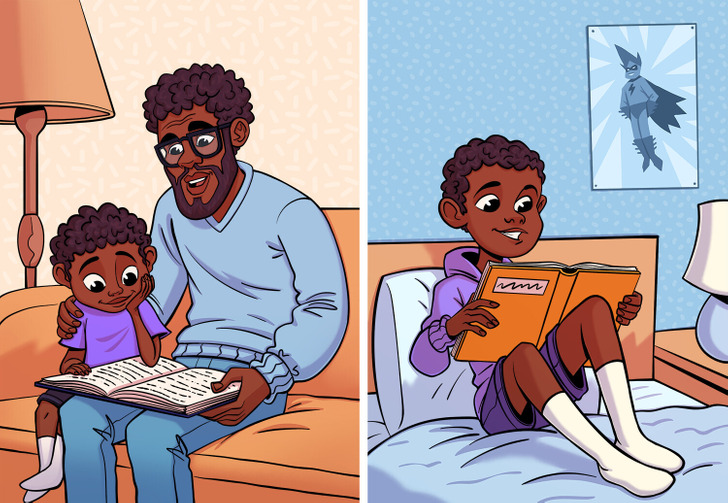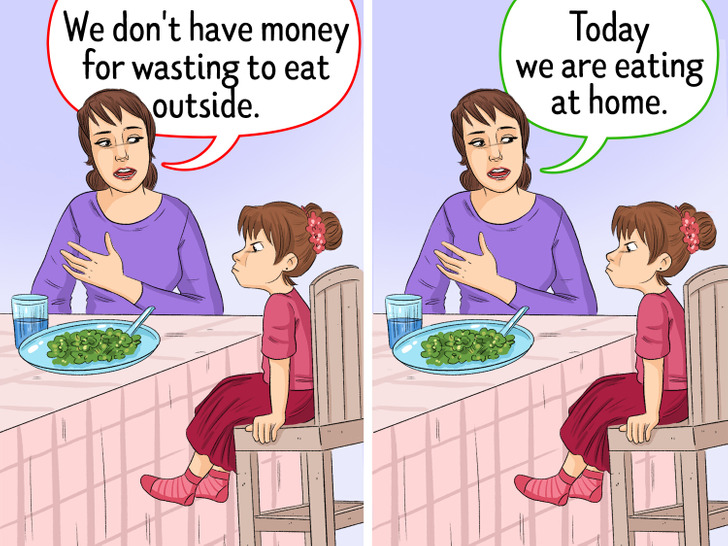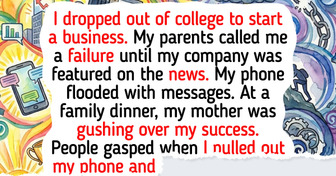I think, I can never earn over which I paid by my precedent employer, but I was wrong, world is so large to try their fate. but now I am making $52/h even more,and easily earn minimum $1300/week, on the experience everyone must try to do work online, easy way to earn, here's an example.
𝐰𝐰𝐰.Richnow05
10+ Common Mistakes Parents Make That Will Cause Their Children Money Issues

Concerned about their children's futures, parents often look for universal parenting techniques to secure their kids' success and happiness. However, as times change, old success principles may no longer apply. Ironically, actions meant to help can sometimes create new challenges for their children's future.
1. Forcing their child to choose a future career

The idea that one should remain in a single career for their entire life is becoming outdated and impractical. Numerous modern jobs didn't exist ten years ago, and many others have already become obsolete.
- From a young age, Max was passionate about exploring computers and learning different software programs. Despite his parents' concerns, he followed his interest and found online courses in software testing. Today, he is excelling in this field, utilizing his skills and potential.
2. Guiding their child in learning how to save money

Learning to save money is a good thing, as long as you also teach them to balace that with buying stuff you realy want to.
The world is constantly evolving, and traditional methods of making or saving money may no longer be effective. Since we can't predict which skills will be valuable in the future economy, it's crucial to teach children to be adaptable and prepared for change, not just to focus on saving money.
- Emily's grandfather saved money his entire life "just in case." However, when that "case" finally occurred, a financial meltdown caused all his investments to lose value. Witnessing this during her childhood, Emily now worries that the economy could collapse at any moment. She believes the best investment is in her skills and knowledge.
3. Restricting their child from using social networks
Social networks have become the modern-day equivalent of the yards and neighborhoods where we used to play as children. Kids can acquire valuable skills through computer programs integrated with social media platforms. While parents should remind their children about online safety rules, depriving them of this experience can be too restrictive.
- Aria's mother was astonished to find that her 10-year-old daughter had learned to create impressive videos. Even more surprising was the fact that Aria had acquired this skill by using TikTok. Now, creating short videos has become a family hobby for them.
4. Rewarding a child with money for good grades

They get a reward when they obviously did their best, not only for good grades.
This topic is still debated, but consider this scenario: imagine being a contractor who continuously pays more for a product or service, with the child as the supplier. It doesn't sound ideal, does it?
- Alexandra's parents tried to encourage her academic success by offering monetary rewards. Initially, this strategy seemed to work, as her grades improved. However, they soon discovered that Alexandra had been inventing stories about a fictitious illness and telling her teachers that her parents were constantly criticizing her for poor grades. The sympathetic teacher, feeling sorry for her, then raised her grades out of pity. After learning this, Alexandra's parents stopped offering money for grades and sought help from a child psychologist.
5. Preventing their child from experiencing failure

Perfectionist parents often strive for flawlessness in their own lives, which leads them to demand increasing levels of perfection from their children as they grow older. This could range from criticizing the child's artwork for not being good enough to scold them for not making their bed perfectly or not studying hard enough. The child endures constant criticism and reprimands, without the opportunity to learn from their mistakes. As a result, children of perfectionist parents may either become perfectionists themselves or develop low self-esteem and lack confidence. Both outcomes can adversely affect their future careers.
- Anna's mother always compared her to Mary, saying, "Look how tidy Mary is compared to you, Anna!" Despite Anna's efforts to emulate Mary, she never seemed to measure up, and her mother's criticism only grew harsher. Anna's mother never gave her the chance to improve her habits or learn basic skills. Now, at 25, Anna still compares herself to others and always feels inadequate. This constant comparison has significantly harmed her self-esteem.
6. Failing to defend their child in front of strangers

Every child needs to know that their parents will support them in any conflict, no matter the situation, and won't automatically side with authority figures like teachers, principals, or neighbors. Allowing children to speak up for themselves and take responsibility for their actions fosters healthy self-esteem and a sense of personal accountability.
- Maggy was raised by her grandmother, who frequently asked, "But what will other people think?" Despite her grandmother's love and good intentions, this constant focus on public opinion left Maggy struggling to make her own decisions. Now, even when choosing something as simple as dessert, Maggy relies heavily on her friends' opinions, unable to trust her own judgment.
7. Limiting their needs

Sometimes when kids ask their parents to buy them things, they hear, "We need to prioritize." Some parents frequently put their children in these situations, unintentionally teaching them to sacrifice essential needs for other items. This pattern can significantly impact their financial habits as adults. Conversely, always fulfilling a child's every request can also have negative effects.
- Jane's dad often insists on buying notebooks instead of brushes, prioritizing one need over another. Jane has learned to overlook her true needs, and with each subsequent request, she withdraws more, knowing not to ask. When Jane grows up and earns her income, she might spend money on unnecessary items because that's how she's learned to manage her priorities.
8. Disagreeing over finances in front of them

Since children can internalize lasting messages from their surroundings, it's essential to avoid arguing about money or other issues in front of them. Rather than engaging in one-on-one conflicts, which can cause children to take sides and become distressed, discussions should be conducted in a way that encourages positive involvement.
- Chris grew up witnessing his parents argue about money. When he went to college at 17 and moved away, he struggled with managing his finances and often spent on unnecessary items. Now, he fears starting relationships, believing that money is the root cause of his unhappiness.
9. Comparing themselves to successful people for inspiration

Every generation has its own set of heroes that young people aspire to emulate. In recent decades, stories of personal success from wealthy and influential individuals have become particularly prominent. However, achieving happiness and success isn't as simple as following their life stories. If it were, everyone who read their books would have resolved all their financial problems by now.
- From a young age, Alex was passionate about computers. Inspired by the story of Steve Jobs, which his dad had shared with him, Alex dove into learning everything about Apple. When it came time to choose a university, Alex initially thought he didn't need higher education since Steve Jobs succeeded without it. Eventually, Alex realized the importance of education for his career and decided to pursue college. Now, Alex jokes, "What worked for Steve Jobs is just a fantasy for an ordinary guy like me."
10. Teaching the child that they have what they need at home

Yeah so this, in me, ultimately taught "luxuries are a waste of money." And now it's really hard to treat myself because I second guess everything "do i really NEED this? No? Then stop its a waste of money."
Many of us remember asking our parents for something, only to be told, "You already have everything you need at home." Some parents repeatedly place their children in these situations, unintentionally teaching them to overlook their true needs. This behavior can shape their spending habits as adults. On the flip side, always fulfilling a child's every want can also lead to negative consequences.
- Lisa's parents often insist on eating at home instead of dining out, emphasizing that they already have food at home. Over time, Lisa has learned to suppress her desire to eat out, knowing that asking is futile. As she grows up and starts earning her own money, she might overspend on dining out because that's how she's learned to cope with her previously unmet desires.
11. Suppressing their child's ability to express their feelings

Sometimes, adults dismiss a child's feelings as invalid—insisting that bruises don't hurt, feeling anger towards someone who hit them is shameful, or being sad even for a good reason is wrong. Parents often do this with good intentions, aiming to teach their children proper behavior. However, it's crucial to understand that a key skill for modern individuals is the ability to acknowledge and manage their feelings, emotions, and needs.
- Kate, now 37, vividly remembers how her mother forced her to give away her beloved doll to another girl, calling her "greedy" and scolding her for getting upset over a "stupid toy." Kate never got her doll back. Over the years, she has worked hard to assert herself, learning to say "no" to demanding people, including her boss and coworkers. Despite this, Kate often feels guilty whenever she refuses their requests.
12. Shielding children to avoid conflicts

The ability to engage with others is one of the most essential professional skills. It's important not only to help children make friends but also to teach them how to engage in healthy arguments. People often have differing opinions, and there are various ways to express emotions. The sooner children grasp this concept, the easier their interactions with others will be, including in professional settings.
- Michaela spent her life avoiding conflicts, preferring to agree with others rather than engage in disputes. She believed that someone always had to be the "smarter" one, but this approach proved more harmful than beneficial. One day, Michaela learned about active listening and decided to apply this approach in her professional life. She excelled at paying attention to others' perspectives while also expressing her feelings when others attempted to take advantage of her. Initially, people found her communication style unconventional, but conflicts with coworkers became more constructive, leading to mutually beneficial resolutions.
Unfortunately, parents often make mistakes they later regret. Check out what these 20 parents did that they now regret more than anything.
Comments
Related Reads
10+ Internet Mysteries That Were Solved by Internet Sherlocks

I Refuse to Let My Husband Co-Own My House, It’s Part of My Inheritance

I Canceled My Husband’s Birthday Party After Hearing What He Secretly Told My Daughter

14 Stories of Sudden Realizations That Crushed People’s Realities

15 Moments That Show Kindness Is Quiet but Changes Everything

16 Moments That Remind Us to Stay Kind Even If the World Turns Ice Cold

I Refuse to Let My Parents Use My Success Story After They Called Me a Failure

14 Times Reality Proved to Be a Better Screenwriter Than Hollywood Could Ever Be

15 Stories That Capture the Bittersweet Journey of Blended Families

16 Moments That Show Kindness Is the Strength the World Needs

I Refused to Let My Toxic MIL Move In—Now My Husband’s Family Says I’m Ruining Their Lives

I Refuse to Forgive My Wife for What She Did to My Son

